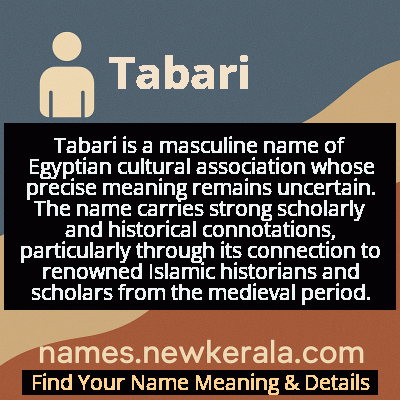Tabari Name Meaning & Details
Origin, Popularity, Numerology Analysis & Name Meaning of Tabari
Discover the origin, meaning, and cultural significance of the name TABARI. Delve into its historical roots and explore the lasting impact it has had on communities and traditions.
Name
Tabari
Gender
Male
Origin
Egyptian
Lucky Number
6
Meaning of the Name - Tabari
Tabari is a masculine name of Egyptian cultural association whose precise meaning remains uncertain. The name carries strong scholarly and historical connotations, particularly through its connection to renowned Islamic historians and scholars from the medieval period.
Tabari - Complete Numerology Analysis
Your Numerology Number
Based on Pythagorean Numerology System
Ruling Planet
Venus
Positive Nature
Harmonious, responsible, caring, and artistic.
Negative Traits
Overly idealistic, superficial, possessive, or jealous.
Lucky Colours
Pink, turquoise.
Lucky Days
Friday.
Lucky Stones
Diamond, turquoise.
Harmony Numbers
2, 3, 9.
Best Suited Professions
Artists, musicians, teachers, healthcare workers.
What People Like About You
Warmth, nurturing nature, artistic flair.
Famous People Named Tabari
Muhammad ibn Jarir al-Tabari
Historian and Scholar
Authored the monumental historical chronicle 'History of the Prophets and Kings' and a comprehensive Quranic commentary
Ali ibn Sahl Rabban al-Tabari
Physician and Scholar
Wrote 'Firdaws al-Hikmah' (Paradise of Wisdom), one of the earliest comprehensive medical encyclopedias in Arabic
Abu'l-Hasan al-Tabari
Islamic Jurist
Significant contributor to Shafi'i school of Islamic jurisprudence and author of important legal texts
Name Variations & International Equivalents
Click on blue names to explore their detailed meanings. Gray names with will be available soon.
Cultural & Historical Significance
It represents a bridge between Persian geographical origins and broader Islamic scholarly traditions that flourished in Egypt, particularly during the Fatimid and Mamluk periods when Egyptian centers of learning attracted scholars from across the Muslim world. The name embodies the rich tradition of Islamic scholarship that found fertile ground in Egypt's ancient academic institutions, including Al-Azhar University, making it symbolic of the country's enduring role as a center of Islamic learning and cultural preservation.
Extended Personality Analysis
Individuals named Tabari are often perceived as intellectually curious, deeply analytical, and possessing strong historical consciousness. They tend to be methodical thinkers with a natural inclination toward research, documentation, and preserving knowledge. Their personality is frequently characterized by patience in investigation and a respect for tradition balanced with critical thinking.
Tabaris are typically seen as reliable and thorough individuals who approach problems with systematic consideration rather than impulsive reactions. They often exhibit strong communication skills, particularly in explaining complex concepts, and may demonstrate leadership through knowledge and wisdom rather than authority. This name suggests someone who values accuracy, has strong moral convictions, and maintains a balanced perspective informed by historical context and cultural understanding, making them natural educators, researchers, or cultural preservers.
Modern Usage & Popularity
In contemporary times, Tabari maintains steady but selective usage, primarily among families with strong connections to Islamic scholarly traditions or Egyptian cultural heritage. The name is more commonly used as a surname than a given name in modern contexts, though it continues to be chosen for boys in educated, traditionally-minded families who value its historical and intellectual associations. Its usage remains relatively rare in Western countries but sees periodic revival among diaspora communities seeking to preserve cultural and scholarly lineages. The name's popularity has remained consistent rather than trending, appealing to parents seeking distinctive names with deep cultural roots and academic prestige rather than following contemporary naming fashions.
Symbolic & Spiritual Meanings
Symbolically, Tabari represents the preservation of knowledge, the continuity of scholarly traditions, and the bridge between different cultural realms. It embodies the metaphor of the historian as a guardian of collective memory and the scholar as a link between past and future generations. The name carries connotations of wisdom accumulated through careful study, the importance of accurate transmission of knowledge, and the intellectual legacy that shapes cultural identity. It symbolizes the idea that understanding history provides guidance for the present and future, making it a name that suggests both rootedness in tradition and forward-looking perspective, while also representing the enduring power of recorded knowledge to transcend time and geographical boundaries.

